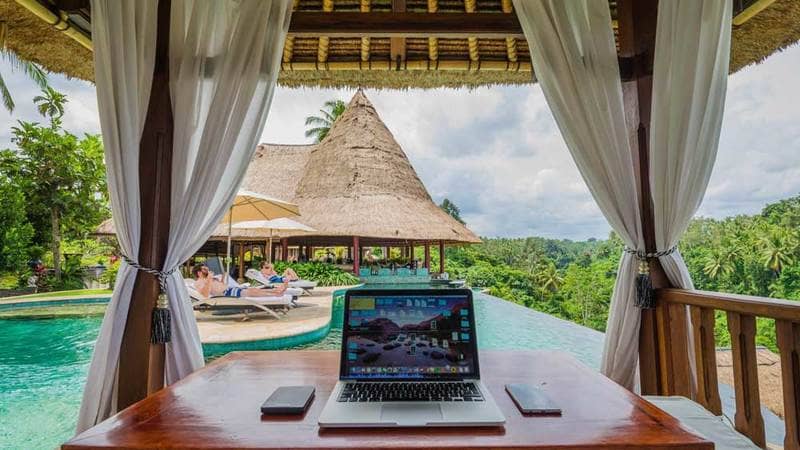Indonesia’s Coordinating Minister for Maritime Affairs and Investment, Luhut Pandjaitan, is pushing the Indonesian Government’s Work from Bali campaign once again, encouraging not only personal or private sector to do so, but also ministries. He stated that because ‘working from home’ was already a norm now, then why not work from Bali to help the tourism industry. On 18 May 2021, he signed a Memorandum of Understanding with hotels in the Indonesia Tourism Development Corporation complex of Nusa Dua, who would be providing accommodation and facilities for his own ministry. He encourages other ministries and businesses to consider doing the same.
Why Working from Bali is on the Rise? Prior to the pandemic, the idea of working from Bali was an idyllic dream that seemed to be reserved for the likes of digital nomads or those who had ‘left it all behind’ and started life anew on the paradise island. However, the world, and what is considered normal, has changed in the last year, and opportunities to experience new ways of living have opened up. For most people, the requirements of physically being in an office every weekday to do their job effectively has rarely been questioned. Where your office is based, well, that’s where you’ll be working. It made sense. That is, until the pandemic forced many of us to remain in the confines of our homes, where we had to adapt and change the very fabric of our known work routines. A year later, whilst some have returned to their offices, others have discovered that their physical presence at work creates no better productivity. With effective use of new communication systems and platforms, whole workforces are finding that they can - and in fact always could - work from anywhere. When this realisation came, many city-dwellers, especially Jakartans, took this as an opportunity to experience life working from Bali.
Who is Working from Bali for? It’s important to distinguish between working from Bali, and working in Bali. The latter alludes to finding a job based in Bali, and the former means continuing the same line of work whilst you are physically based on the island. Many people probably have an image of web developers typing away in a bamboo shack (with high-speed internet), overlooking views of rice fields. The stereotypical digital nomad lifestyle likely dominates this idea of working remotely. However the pandemic has truly opened up the breadth of experiences that are possible when it comes to working from Bali. The first important point is that working from Bali is now for anyone. Recent months have shown that top executives have relocated, temporarily, into resorts, working in their suites during the day as their families enjoy the facilities. Children, after all, are also not bound to any one location with distance learning continuing to be a norm. Younger executives and freelancers have rented villas with friends and colleagues, or rooms in guesthouses, working as normal during the day, but able to enjoy a more free, natural and laidback lifestyle when they’ve ‘clocked out’.
Why Work from Bali? Of course, the usual spiel remains relevant: access to beaches and the outdoors, a more relaxing (and inspiring) atmosphere, great service and experience through the tourism industry. These all remain true, but to temporarily move to Bali, the reasons must be deeper. For parents, the move to Bali is undeniably beneficial. Children living in the city are devoid of experiences in the natural world. Bali has nature abound: learning to surf, cycling in neighbourhoods, going for walks in fields. These are priceless experiences that a child benefits from. Not to mention, Bali now really caters to parents, with many extra-curricular classes and activities on offer, from art to music, and dance, skateboarding, and more. Another benefit of being on the island is the ease of travel. Residents can attest to the diversity of experiences available to them: one weekend in Ubud, another on the east coast, another in the Bedugul highlands. Add to that the creative activities now available, from pottery, painting, textile workshops, and more, and you rest assured your weekends will be rewarding and enriching.
What’s more, Bali still remains relatively quiet. Traffic is minimised, hotels are at a low occupancy, and - apart from a few areas - beaches, restaurants, tourists are quiet too. This makes it not only safer than life in the city, but allows one to revisit areas around the island without the hordes of tourists.
https://nowjakarta.co.id/updates/news/work-from-bali-not-just-for-digital-nomads

